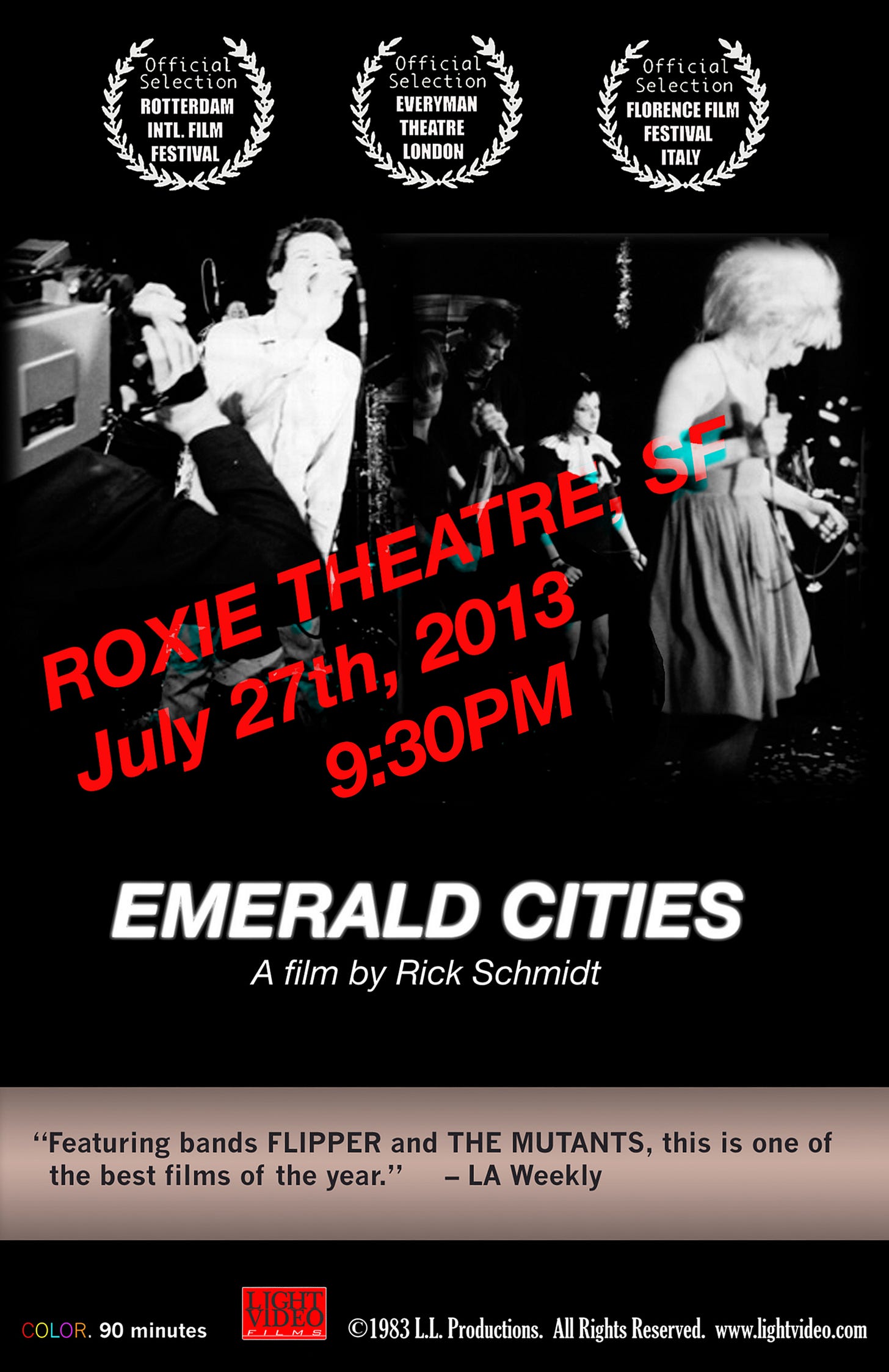A MAN, A WOMAN, AND A KILLER, SHOWBOAT 1988, EMERALD CITIES (The Trilogy): https://vimeo.com/ondemand/manwomankiller https://vimeo.com/ondemand/showboat1988 https://vimeo.com/ondemand/emeraldcitieshd
POSTING SOME LINKS to watch movies during Xmas 2023 (link below for info- "SLEEPER TRILOGY--Three Undiscovered First Features by Rick Schmidt" <https://www.penguinbookshop.com/book/9798211681323>).
RICK SCHMIDT'S FILM TRILOGY PORTRAYAL OF AMERICA 1973-1983 by Vic Skolnick, CINEMA ARTS CENTRE, November 1984.
Rick Schmidt is a filmmaker of free-wheeling derring-do who believes that people's lives are or can be as dramatic, hilarious, and exciting as the artificially recreated life on film. Following his own advice, he plays fast and loose with the forms and norms that divide films into supposedly well-defined categories--narrative, documentary, docu-drama.
His approach to film combines the zany, mad-cap screwball style of the Marx Brothers and the sensibilities of the surrealist with a decidedly American flavor. In the development of the plot, Schmidt's performers act out both their real lives and the make-believe roles. They are a "visible" part of the act of making the film, which creates a unique mix of fact and fiction: art and life intermingle and imitate one another.
Lead actress Carolyn Zaremba (right), on the set of A MAN, A WOMAN, AND A KILLER (Mendocino, CA), prepares for final scene (Photo by Ed Nylund ©1975).
In effect, Schmidt entertains us with his demystification of phony media-inspired glamorous, exciting images that we see in the movies and which are supposed to make up for what is missing in our seemingly lackluster lives. It could be said that Schmidt's films foster a renewed awareness and appreciation of the powerful emotions experienced in our so-called normal, humdrum lives: love, lust, sex, hatred, ambition, and greed, and real fears, anxieties, frustration, illness, and death.
Aware that the financiers of the American Dream factory would never fund his films, Schmidt, undeterred, has learned to make films on a shoestring budget. His friends, Dick Richardson, a writer and actor, Carolyn (Z) Zaremba, actress, and Ed Nylund, a retired librarian, who have appeared in all three of Schmidt's trilogy films, serve as an informal stock company. As Nylund comments in A Man, A Woman, And A Killer, "I get to act in these movies, because I'm the only old guy the filmmaker knows." Richardson, who often appears as an ex-con, former alcoholic and drug addict, is all of those things. When Schmidt, at the end of Emerald Cities appears in a dress as a stand-in for Carolyn Zaremba, he does so because Carolyn left for New York to commit herself to a full-time career as an actress.
For Schmidt, the quintessential American independent filmmaker (he sold his classic 1939 pickup truck to help finance one of his films), necessity is the mother of invention. —Vic Skolnick, CINEMA ARTS CENTRE
“An extraordinarily intriguing first feature [A MAN, A WOMAN, AND A KILLER] by west coast filmmakers Rick Schmidt and Wayne Wang. Beautifully shot in a California landscape, the film flows back and forth between the fiction of a script and the half-submerged reality of the actual writing of the script. The use of subtitles in an English language film add to the fascinating complexities of content and form.” —Marc Weiss, BLEECKER ST. CINEMA, POV.
This CENSORED VERSION of “Showboat (1988)” was accepted at the London Film Festival (1980) and was ultimately purchased by Channel Four in the UK, screening to 330,000 Londoners on a prime-time Friday night. Perhaps that's where it morphed into England's Got Talent, American Idol, The Gong Show, America/UK’s Got Talent, The Voice etc. Just look for four judges at a table––same as in 1988. And in each case, each reality TV showcase, there is one overly-abrasive judge––that’s identical to the Showboat 1988 character, “Co-Producer,” played to perfection by Skip Covington.
“The film was originally titled, Showboat 1988: The Remake. However, in answer to objections from Metro-Goldwyn-Mayer Inc., director Schmidt deleted all references to the play or novel (“Show Boat” by Edna Ferber). Schmidt actually staged open auditions in San Francisco’s California Hall for the alleged remaking of “Showboat.” As in “A Chorus Line,” the auditions are the heart of the story, except in “1988” those who try out are not just show-business types, they represent a microcosm of American society, from the elderly couple who dream of dancing on the “Lawrence Welk Show” to a bearded transvestite in a tutu. By saying: Write your own fantasies in celluloid,” the film examines our voyeuristic national tendency, which is evidenced by all those who want to appear on television game shows, of needing the validation of an audience in order to perform our lives. Unlike the material from which it borrows, “1988” strips away the structure of its fantasies, leaving the audience as well as the performers naked and vulnerable. Courage to those who can live without dreams.” —Linda Gross, LOS ANGELES TIMES
“1988 recounts the fictitious tale of a middle-aged librarian’s attempt to finance and remake the film musical “Showboat” in contemporary terms. The auditions are arranged on a San Francisco stage, and range from incredible to merely bizarre.” —Variety
“1988 in its cumulative preposterous flummery is a spirited outcry for people to throw off the covert and overt forms of oppression and be themselves. Beneath the film’s Quixotic humor and surprisingly touching pathos stands the surrealist belief that art is never more important than life. An outrageous tour-de-force.” —Vic Skolnick, CINEMA ARTS CENTRE
“There are moments in its narrative sequences [EMERALD CITIES], as well as the musical interludes featuring new wave bands Flipper and The Mutants, of genuine apocalyptic craziness.” —CHICAGO READER
“After not seeing the film [EMERALD CITIES] for ages it was a delight to experience how absolutely mad the film is. Very Topsy-Turvy with little regard for helping the audience keep track of what exactly is going on, except to be a witness to the world completely falling apart. Nothing wishy-washy about your political point of views either and your radical disregard for much established cinema language. This potpourri is outrageously disrespectful to all established institutions, from fatherhood, to Santa Claus. It needs a warning label on it to shelter anyone who still loves mom’s apple pie, and the myth of America. Congratulations. We need a good slap in the face once in a while, and EMERALD CITIES delivers it.” —William Farley, director; Citizen, I Wanted To Be A Man With A Gun.
“Mr. Schmidt’s 1983 film, Emerald Cities, mixes images of nuclear destruction, the death of Santa Claus, desert isolation, real and fictional politicians (who all seem equally deranged in the film’s context) and punk rock despair in a strange pop-cultural odyssey. It’s all held together by a satirical narrative that savages most of the conventions of American life.” —Robert C. Trussel, KANSAS CITY STAR
“The film is Rick Schmidt’s provocative, and compassionate 'howl' at the gathering tide of nuclear lunacy as the mass media adjusts us to the 'new dark ages' of limited nuclear war. Schmidt’s film style is blending the mad-cap humor of the Marx Brothers, a heady version of American surrealism, and iconoclastic inspiration, perhaps from Jean Luc Godard.” —Vic Skolnick, CINEMA ARTS CENTRE
Lead actress Carolyn Zaremba (above) in Death Valley, CA, for EMERALD CITIES, (Photo by Julie Schachter ©1983)
These three features are about more than any American dream, if such a thing still exists in the New Millennium. They lay out a value system of freedom, joy of self-expression, a "One World Family" of youthful exuberance, that the years quickly deserted. The "gangsterism"storyline of “A MAN” (Richardson speaks through his scripting to pronounce, "Free will is a joke as far as I'm concerned"), to the parade of energetic-but not necessarily “talented-in-the-normal-sense” performers in Showboat’s auditions—the movie's main content) who mainly are exhibiting their ideas about life, and love, through their 4-minutes of stage-time––to Emerald Cities and its riding fear of nuclear war paired to the shaggy-dog story about a dime-store Santa who gets killed on the streets of San Francisco––all of them shout out the expansive spirit of that exact time that was quickly capped off, disavowed, ended with governmental programs that penalized the poor, stripped free education (at UC Berkeley and many other colleges), generated new and more-inappropriate wars (against...who? And Why?), and began their march to squelch woman's and gay rights, reverse freedom of abortion, crush the very spirit of the people represented in Schmidt's trilogy. If you need a lesson in what has been lost to the dream of America, then catch these important documents online (Cinedigm has recently acquired rights to presentation) or wait for the rare film screenings.








I love these reviews!